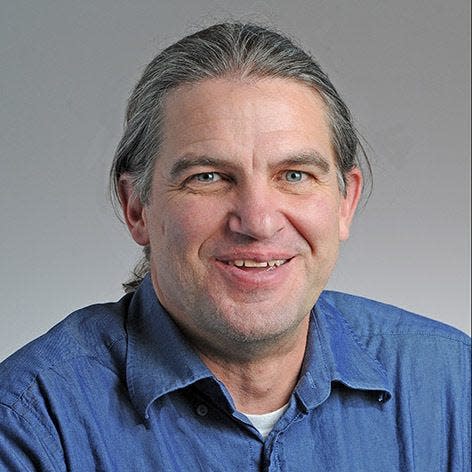Despain: Pope Francis calls for 'Christian economy'
- Oops!Something went wrong.Please try again later.

Pope Francis has become the eminent voice of the economically destitute and the environment. Since being elected to the papacy Pope Francis insists that we need a new economic system that better provides basic needs for the global poor, along with guaranteed work and land.
Regarding the environment, Pope Francis contends we “must not be indifferent or resigned to the loss of biodiversity and the destruction of ecosystems, often caused by our irresponsible and selfish behavior.”
He warns: “Because of us, thousands of species will no longer give glory to God by their very existence. … We have no such right.”
For Pope Francis, economic destitution and environmental destruction are symbiotically linked. “Climate change is,” according to Pope Francis, displacing people, increasing poverty and “contributing to the heart-rending refugee crisis. The world’s poor, though least responsible for climate change, are most vulnerable and already suffering its impact.”
Pope Francis emphasizes globally there are a series of "profoundly interconnected crises" in “the areas of health care, the environment, food supplies and the economy,” not to mention regional wars, “social, humanitarian and ethical crises,” all calling for a “new vision,” to “rethink the future of the world," and establish “a renewed sense of shared responsibility for our world.”
Most recently in May, Pope Francis urged his audience, “We cannot live with the economic pattern that comes from neoliberalism and the Enlightenment. Nor can we live with an economic pattern that comes from Communism. We need ... a Christian economy.”
Coming from the papacy, these comments are astounding.
Neoliberalism is not in reference to liberal politics in the American sense, rather by “neoliberal economic patterns” the pope is referring to various free-market-oriented views.
Similarly to former President Trump’s critique of “globalists” and Sen. Bernie Sanders' critique of multinational corporations, Pope Francis clearly understands global supply chains are both a blessing and curse.
Global supply chains today are coordinated by gigantic multinational companies that easily cross borders to avoid paying taxes and circumvent national-level trade regulations. Meanwhile workers are prohibited from freely crossing borders. Profits of multinational corporations have trended upwards, while wages trend downwards. These economic patterns have worsened income inequality in both developed and emerging economies.
Pope Francis maintains “however much we are asked to believe this dogma of neoliberal faith. Whatever the challenge, this impoverished and repetitive school of thought always offers the same recipes. Neoliberalism simply reproduces itself by resorting to the magic theories of ‘spillover’ or ‘trickle’ – without using the name – as the only solution to societal problems.”
By “spillover” and “trickle” effects, Pope Francis is referring to the supply-side economics dominant from 1980 to 2008, promoted by theories from economic prophets Milton Friedman and Friedrich Hayek.
According to the prophecies of Friedman and Hayek, markets indirectly fix social problems such as racism, sexism, poverty, inequality and environmental destruction. For example, corporate tax cuts would increase corporate profits, and “spillover” and “trickle down” to workers in the form of higher wages.
The only problem is, wages usually don’t rise.
Pope Francis contends that supply-side economics is mistaken and Friedman and Hayek are false prophets. The pope worries that too many “people continue to defend trickle-down theories which assume that economic growth, encouraged by a free market, will inevitably succeed in bringing about greater justice and inclusiveness in the world. This opinion, which has never been confirmed by the facts, expresses a crude and naïve trust in the goodness of those wielding economic power and in the sacralized workings of the prevailing economic system.”
The pope insists “the marketplace, by itself, cannot resolve every problem.”
Indeed, the neoliberal marketplace order, according to Pope Francis, inevitably generates regional conflicts and “unjust wars,” and intensifies refugee crises, global poverty, food insecurity and environmental destruction.
“The most important lesson we can take from these” profoundly interconnected “crises is our need to build together, so that there will no longer be any borders, barriers or political walls for us to hide behind.”
Since 1980s, the labor share of national income has fallen across the globe, while corporate profits have increased.
The United States labor share of income has fallen by 8%.
Globally, economic research shows in the last 30 years labor income share has on average decreased approximately 10% and is currently at its historical minimum. An important definitive study verifies global trade in the past 40 years has decreased labor share in both advanced and emerging economies. All of which supports Pope Francis’ criticism of supply-side economics.
The pope has called for a new global economic system that prioritizes people and not "an idol called money.” For the past three years Pope Francis has rigorously promoted a highly inspiring initiative called the Economy of Francesco, promoting an open international dialogue of especially young economists, entrepreneurs and change-makers engaged toward global change and social justice. Several thousands of young people have just met in Assisi, Italy, to discuss and promote the Economy of Francesco.
An uncritical theology of global free trade lies shattered. We need to better promote the benefits and harms of global free trade.
The Economy of Francesco aims to accomplish exactly this, to generate socioeconomic patterns placing people over profits, and to establish a healthy environment.
Hans G. Despain, Ph.D., is chair of the economics department and the honors program at Nichols College.
This article originally appeared on Telegram & Gazette: Nichols College professor Hans Despain on Pope Francis and economy
